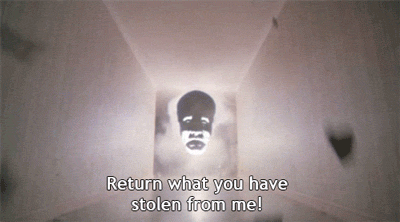or
"How Can You Run and Plot at the Same Time?"
"The Death of Stalin is aimed at inciting hatred and enmity, violating the dignity of the Russian (Soviet) people, promoting ethnic and social inferiority, which points to the movie’s extremist nature. We are confident that the movie was made to distort our country’s past so that the thought of the 1950s Soviet Union makes people feel only terror and disgust."
"[a] western plot to destabilise Russia by causing rifts in society"
Oh, those poor Russkies. They finagle our elections, annex territories, disrupt social media, and conspire with tyrants, while bagging as many rubles for themselves in their so-called "everybody-is-equal" political system.
But, criticize them and they bleat like sheep.
Never mind that the director has been making fun of the British and Americans with his past work—like In the Loop and "Veep"—that no doubt cheers them and think are a laugh riot. But, turn the same satirical eye against them and it's a plot to "destabilise" Russia. As if they needed any help doing that themselves.
In a rather reflective "coalition of the willing" The Death of Stalin combines French, British and American forces; it started as a french comic book, and is a combination of Brit and Yank talents to bring it to the screen. Maybe the Culture Ministry feels that's a little too much attacking from the same forces. Satire does raise hackles. However, the satire of In the Loop and "Veep" produced an echoing silence (tacit approval?) while The Death of Stalin creates howls of protest and conspiracy concerns. What's good for the goose is not always good for the self-satisfied gander.
So, what's causing the fuss? The Death of Stalin looks at the scrambling done by the prominent members of the Politburo following Stalin's death by a cerebral hemorrhage on March 5, 1953.
The events begin when Stalin (Adrian McLoughlin) requests a recording of a performance he'd heard on Radio Moscow that night. Unfortunately, when the live concert was broadcast, a recording was not made—but one does not disappoint Stalin (one might get shot). So, a second impromptu concert is staged, paying off the piano soloist (Olga Kurylenko), to repeat the performance and rousting a replacement conductor from his bed, after the original one suffers a debilitating accident while fainting at the prospect of any potential consequences. The pianist includes a note with the recording, deriding the Premier, whose reaction (either from the note or the poor rushed recording) prompts his stroke. The guards outside his door hear him collapse, but, having orders not to disturb his sleep under penalty of death, do nothing but hold their post.
The next morning, the dacha housemaid enters the room and finds Stalin unconscious on the floor. Phone calls are made—not to any "good" doctors as many of them have been purged—but to the senior officials under Stalin. They include Georgy Malenkox (Jeffrey Tambor)—who has been rumored to be replaced (and killed) in Stalin's plans, Lavrenti Beria (Simon Russell Beale), the security director of the secret police, the NKVD, and Moscow Party Leader Nikita Krushchev (Steve Buscemi), who is awakened by the news and is so exercised about the event that he arrives at the dacha in pants and pajamas. Beria manages to get there first, finds the body and searches for the key to Stalin's files and manages to smuggle some out. Before Krushchev and Lazar Kaganovich (Dermot Crowley) can arrive, Beria convinces Malenkov that he should be the next Premier, knowing that he's weak and easily influenced. When Krushchev and Kaganovich enter the room, Beria and Krushchev begin to butt heads over who can out-blackmail the other to gain a stronger footing.
But, one should never count their hens. When Stalin is moved by the four (with the help of Anastas Mikoyan (Paul Whitehouse) and Nikolai Buganin (Paul Chahidi) to his bed and examined by the best doctors not currently in prison or a gulag, it looks like the Premier might make a recovery, and the group returns to the fawning postures that (of course) they hope for a full recovery and everything will stay just the same—until Stalin actually dies and they return to dividing the spoils. No sooner do Beria and Krushchev curry favor with Stalin's daughter Svetlana (Andrea Riseborough) while marginalizing his drunken son Vasily (Rupert Friend) and leave the premier's quarters, that the NKVD move in and evacuate the building, take over all the possessions and furnishings and murder any witnesses.
Once Vyacheslav Molotov (Michael Palin) is brought on board (Beria has released his wife from prison where she was imprisoned for supposedly being anti-Stalinist), the group can start having rather tentative meetings and votes on how to proceed—everyone eyes each other to see how the other will vote, hands tentatively half-raised before committing—and is decided that Comrade Krushchev should be kept busy planning the late Premier's funeral...where the personal positioning for power can really move into full swing.
The political fandango is based (advisedly) on true events, with comedic license for interpolations. To see the power elite of Moscow at their most insecure, even while the stakes are life-changing is a hilarious dance of desperation that shows how petty and craven the instincts of those in power can be displayed (even before Twitter). That's what satire does—expose the frailties, whether in people, in systems, in governments, and how the best-laid plans have beach-like foundations. It's a release valve for the toxic stress involved in the absurdities of flawed circumstances. But, the only way to see the humor of it is to admit the flaws. To not do so runs the risks of making the same mistakes over and over...which really is the height of both tragedy, as well as comedy, comrade.





















